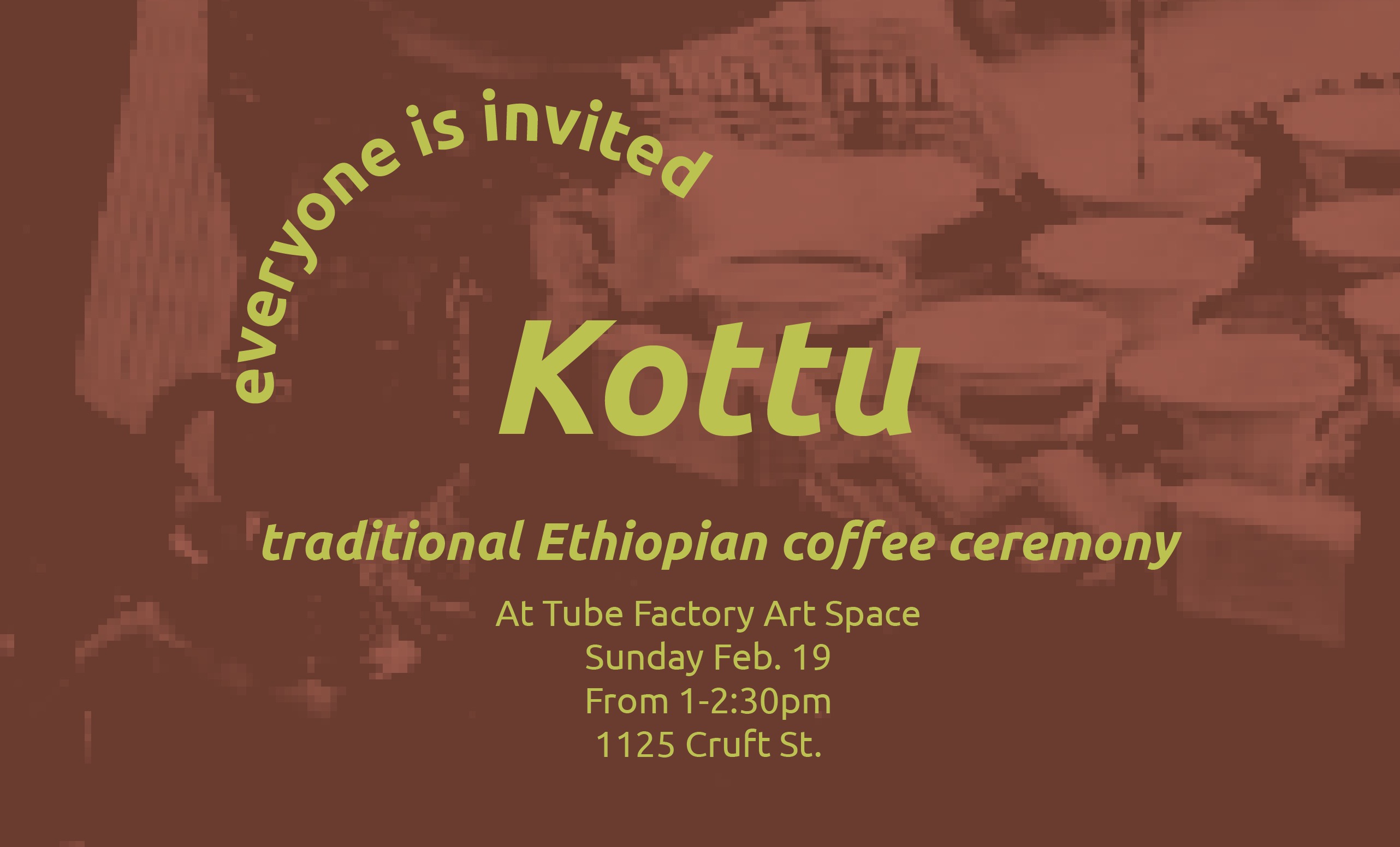
- This event has passed.
Kottu
February 19, 2023 @ 1:00 pm - 2:00 pm
$10
Come spend a restful and slow Sunday afternoon with Yeabsera and Meskerem Tabb, artists in Big Car’s residency program, as they share the Ethiopian culture of hospitality through a traditional Ethiopian coffee ceremony.
Kottu (ካቱ) is an Ormic word that translates to come on in. The Tabbs will share traditional Ethiopian coffee from roasting to brewing while engaging in compelling conversations.
About The Coffee Ceremony
The coffee ceremony is considered to be the most important social occasion in many villages, and it is a sign of respect and friendship to be invited to a coffee ceremony. Guests at a ceremony may discuss topics such as politics, community, and gossip. There is also abundant praise for the ceremony’s performer and the brews she produces.
Regardless of the time of day, occasion (or lack thereof) and guests invited, the ceremony usually follows a distinct format, with some variations.
Beyond pure socialization, the coffee ceremony also plays a spiritual role in Ethiopia, one which emphasizes the importance of Ethiopian coffee culture. Coffee has a long history of association with Islam, and it is said that a transformation of the spirit takes place during the three rounds of the coffee ceremony thanks to coffee’s spiritual properties.
The lengthy Ethiopian coffee ceremony involves processing the raw, unwashed coffee beans into finished cups of coffee. It begins with the preparation of the room for the ritual.
First, the woman who is performing the ceremony spreads fresh, aromatic grasses and flowers across the floor. She begins burning incense to ward off evil spirits and continues to burn incense throughout the ceremony. She fills a round-bottomed, black clay coffeepot (known as a jebena) with water and places it over hot coals.
Then, the hostess takes a handful of green coffee beans and carefully cleans them in a heated, long-handled, wok-like pan. Holding the pan over hot coals or a small fire, she stirs and shakes the husks and debris out of the beans until they are clean.
Once the beans are clean, she slowly roasts them in the pan she used to clean them. During the roasting, she keeps the roast as even as possible by shaking the beans (much like one would shake an old-fashioned popcorn popper) or stirring them constantly. The roasting may be stopped once the beans are a medium brown, or it may be continued until they are blackened and shimmering with essential oils. The aroma of the roasted coffee is powerful and is considered to be an important aspect of the ceremony.
After the hostess has roasted the beans, she will grind them. She uses a tool similar to a mortar and pestle. The “mortar” is a small, heavy wooden bowl called a mukecha (pronounced moo-key-cha), and the “pestle” is a wooden or metal cylinder with a blunt end, called a zenezena. With these tools, she crushes the beans into a coarse ground.
By the time the beans are ground, the water in the jebena is typically ready for the coffee. The performer removes a straw lid from the coffeepot and adds the just-ground coffee. The mixture is brought to a boil and removed from heat.
At this point, the coffee is ready to be served. A tray of very small, handle-less ceramic or glass cups is arranged with the cups very close together. The ceremony performer pours the coffee in a single stream from about a foot above the cups, ideally filling each cup equally without breaking the stream of coffee. The dregs of the coffee remain in the pot. This technique prevents coarse grounds from ending up in the coffee cups.
In some cases, the youngest child may serve the oldest guest the first cup of coffee. Afterward, the performer serves everyone else.
Guests may add their sugar if they’d like. Milk is not typically offered. After adding sugar, guests bunna tetu (“drink coffee”), and then praise the hostess for her coffee-making skills and the coffee for its taste.
After the first round of coffee, there are typically two additional servings. The three servings are known as abol, tona, and baraka. Each serving is progressively weaker than the first. Each cup is said to transform the spirit, and the third serving is considered to be a blessing to those who drink it.
